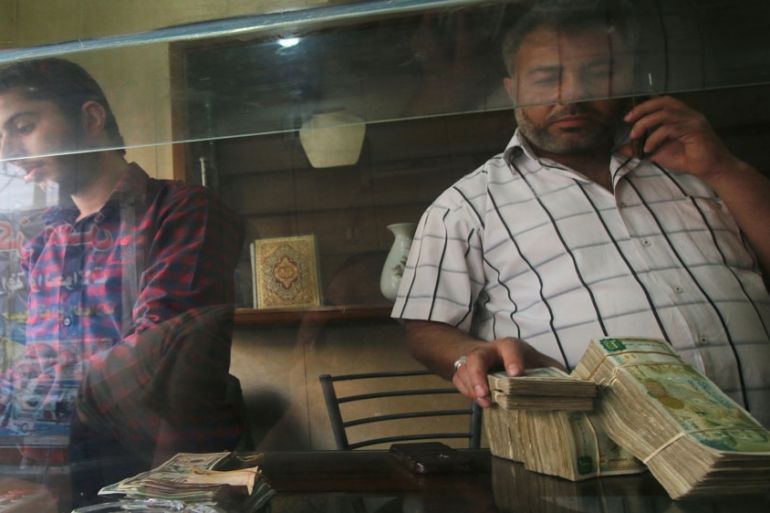Eastern Ghouta: Hyperinflation compounds struggle in rebel area
Residents in rebel-held Eastern Ghouta are running out of cash due to inflation and extremely expensive remittances.

Residents of rebel-held areas in Syria are struggling to afford daily necessities, as hyperinflation is compounding the already dire humanitarian situation in the war-torn country.
Inflation of the Syrian pound (SYP) has resulted in a financial crisis for the majority of civilians in rebel-held Eastern Ghouta, due to lack of money in bank reserves and exchange rates selling at extremely high prices.
Keep reading
list of 4 itemsWhy is Biden ratcheting up the trade war with China?
‘We love Taiwan’: Domestic workers hope for more from new President Lai
Ship that caused deadly Baltimore Key bridge collapse towed to port
The Damascus suburb has been under heavy aerial bombardment by the Syrian government and Russian warplanes in the last two weeks.
Adnan al-Ali, a money exchange employee in the town of Saqba, is responsible for handling remittances sent by people to their relatives in Eastern Ghouta, but said that business has been affected by the constant attacks.
“Our first office was bombed last month, injuring some of our staff,” he told Al Jazeera. “We had to move our office underground where it’s safer for us and our customers.
“During the day, it gets crowded with people who have money sent to them from their friends and relatives outside Eastern Ghouta or from different countries.”
Economic losses
According to the World Bank, the seven-year Syrian war that has devastated the country has incurred $226bn in total economic losses so far, “about four times the Syrian GDP in 2010”.
Humam Jazairi, a former minister of economy, was quoted by the Financial Times in November 2016, saying that the inflation rates have increased up to 400 percent since 2011.
Furthermore, Syria’s reserves have depleted rapidly, from $18bn prior to the outbreak of the uprisings in 2011 to $700m in 2016.
![A portrait of Syria's President Bashar al-Assad is seen printed on the new Syrian 2,000-pound banknote that went into circulation in July 2017 [Reuters]](/wp-content/uploads/2018/03/0c48f48c603847dfb26d5d2f5d0c11bf_18.jpeg)
The “severe decline in oil receipts since the second half of 2012 and disruptions of trade due to the conflict” have heavily affected the exchange rate and depreciated the currency, the World Bank said.
The Syrian pound, which used to sell for 50 to one US dollar before the war, is now selling at an average of 500 SYP to one dollar. Skyrocketing prices have since bankrupted a large portion of the population, with many facing poverty.
Cost of smugglers
Holham Jazmate a member of the Syrian Economic forum in Turkey told Al Jazeera that money exchange offices contact smugglers inside Damascus in order to bring cash into Eastern Ghouta.
The smugglers then extract a profit fee of up to 25 percent of the cash being delivered.
“A lot of the owners of money exchange offices also own food stores,” Jazmate said. “They increase the price of food to civilians to make up the difference for paying the smugglers to bring the cash into the city.
“As there is no official observation of the prices or the money transaction rates, these offices get what they want from the people, who desperately need cash in order to buy necessities,” he added.
Adnan al-Ali said that the smugglers have to go through the government checkpoints to enter Eastern Ghouta and pay a bribe to the soldiers.
“These soldiers, even though they are at war with the rebels, do business with them,” he said. “However, the price that the smugglers ask to be paid to bring money inside Eastern Ghouta is high.”
This leaves money offices with no choice but to increase the price of the exchange rate, he continued.
“It is ultimately the people of Ghouta who have to pay the difference in order for the smugglers to profit,” Ali said. “People think we are taking advantage of them and of the situation, when, in fact, it is the opposite.”
The reason behind the increasing and decreasing rate is because the reserves are drying up and there is a limited and short amount of cash, he explained.
“On the other hand, if we had cash in the coffers then the exchange rate would automatically go down,” he said.
‘Everyone is struggling’
Khaled Samra works in a mobile market in Eastern Ghouta and relies on cash transfers to and from outside the city to buy stock.
Since the siege, however, he says that pretty much everything he earns would be spent just to pay the transfer fees.
Recently, he lost his store to an air raid. Until now, he has been staying in the shelter not knowing the degree of damage to his shop.
“I’ve had to stop working as a result. I simply couldn’t operate my business in this way and I was losing money every day.
“Before the siege, it was all a smooth process but it has become so complicated and now costs a fortune to send or receive money. I simply can’t handle it, and there is no point for me to continue my work.”
Sarah Majbale, a 33-year-old widow with four sons, is just one of the thousands of people affected. Since her husband was killed in an air raid two years ago she has been relying on money sent by her brother in Damascus, as well as handouts from the local council and several small NGOs.
“We can’t leave out of security reasons and we do not have enough money,” she said. “I was trying to save a little every month but after the siege of Eastern Ghouta it became very difficult to get any money, especially from regime-held areas.”
“I’ve had to borrow money from friends just to survive but food prices in the besieged city are getting extremely high. Everyone here is really struggling.”